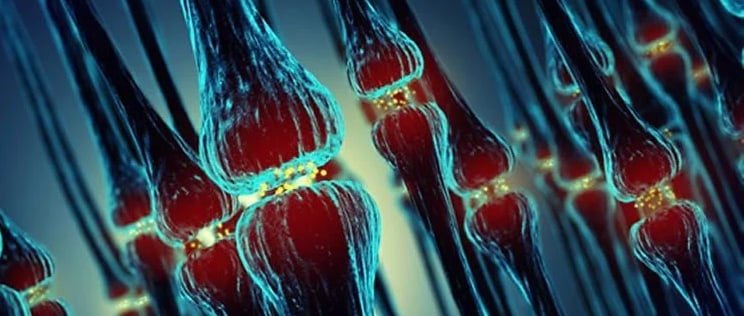
FGL

Our brain contains trillions of neuronal connections. These connections are called synapses and their pattern of activity controls all our cognitive functions. These synaptic connections are constantly changing in their strength and activity level. This is known as “synaptic plasticity” and it’s essential for learning and memory. Synaptic plasticity is the ability of synapses to strengthen or weaken over time, in response to increases or decreases in their activity.
Poor memory and cognitive deficits, such as autism and Alzheimer's disease are thought to be due to changes in synaptic plasticity mechanisms. Studies show that synapses can be made more plastic using a small peptide made from a neuronal protein involved in cell-to-cell communication. This peptide is called FGL (Fibroblast Growth Factor).
What is FGL?
FGL is a peptide derived from the neural cell adhesion molecule (NCAM). NCAM is a glycoprotein that is found on the surface of nerve cells (neurons) and glial cells (protect neurons). NCAM activates FGL which in turn stimulates the production of new projections of developing neurons.
FGL also plays a role in the formation of synapses between neurons which results in improved synaptic plasticity and neuronal development. This in combination with enhanced synaptic transmission means FGL can help encode information, resulting in improved learning and memory. Add in neuronal cell protection and preservation and FGL becomes an important peptide with the potential to treat multiple conditions affecting cognitive function.
Potential Benefits
Using the FGL peptide can result in these potential benefits:
- Neuroprotective benefits
- Improved cognitive function
- Treatment for traumatic brain injury
- Protection against neurotoxicity
- Improved memory
- Improved learning
- Treatment for cognitive decline (Alzheimer’s)
- Improvements in neuroinflammation
- Antidepressant features
- Enhance Excitatory Synaptic Transmission
FGL Dosing
FGL comes in the form of a nasal spray which is administered daily.
Conclusions
FGL has been shown to improve the brain's ability to modify the connections between neurons, the cellular building blocks of the brain. Many neuroscientists consider understanding plasticity the Holy Grail for learning and memory. Once we understand it, we will understand how the brain learns.
In addition to its effects on neurodegenerative disease, FGL is viewed as a targeted treatment for traumatic brain injury (TBI), memory enhancement, strokes, depression, and general improvement of cognitive function.
FGL’s potential effect on memory and neurodegenerative disease progression have excited many researchers. In 2016, a 60 million dollar grant was awarded for further studies and exploration.
Contact Transformyou to learn more about our options to support your health.
Research
Dallérac G, Zerwas M, Novikova T, Callu D, Leblanc-Veyrac P, Bock E, Berezin V, Rampon C, Doyère V. The neural cell adhesion molecule-derived peptide FGL facilitates long-term plasticity in the dentate gyrus in vivo. Learn Mem. 2011 Apr 20;18(5):306-13. doi: 10.1101/lm.2154311. PMID: 21508096.
Knafo S, Venero C, Sánchez-Puelles C, Pereda-Peréz I, Franco A, et al. (2012) Facilitation of AMPA Receptor Synaptic Delivery as a Molecular Mechanism for Cognitive Enhancement. PLoS Biol 10(2): e1001262. doi:10.1371/journal.pbio.1001262
Zellinger C, Salvamoser JD, Seeger N, Russmann V, Potschka H. Impact of the neural cell adhesion molecule-derived peptide FGL on seizure progression and cellular alterations in the mouse kindling model. ACS Chem Neurosci. 2014;5(3):185-193. doi:10.1021/cn400153g
Fionnuala Cox, V. Berezin, E. Bock, M.A. Lynch, The neural cell adhesion molecule- derived peptide, FGL, attenuates lipopolysaccharide-induced changes in glia in a CD200-dependent manner, Neuroscience (2013), doi:http://dx.doi.org/10.1016/j.neuroscience.2012.12.030
Diego Asua, Ghassen Bougamra, María Calleja-Felipe, Miguel Morales, Shira Knafo, Peptides Acting as Cognitive Enhancers. Neuroscience. Volume 370, 2018, Pages 81-87,ISSN 0306-4522, https://doi.org/10.1016/j.neuroscience.2017.10.002.
Cox FF, Berezin V, Bock E, Lynch MA. The neural cell adhesion molecule-derived peptide, FGL, attenuates lipopolysaccharide-induced changes in glia in a CD200-dependent manner. Neuroscience. 2013 Apr 3;235:141-8. doi: 10.1016/j.neuroscience.2012.12.030. Epub 2013 Jan 18. PMID: 23337536.
Secher T, Berezin V, Bock E, Glenthøj B. Effect of an NCAM mimetic peptide FGL on impairment in spatial learning and memory after neonatal phencyclidine treatment in rats. Behav Brain Res. 2009 May 16;199(2):288-97. doi: 10.1016/j.bbr.2008.12.012. Epub 2008 Dec 14. PMID: 19133297.
Turner CA, Lyons DM, Buckmaster CL, et al. Neural cell adhesion molecule peptide mimetics modulate emotionality: pharmacokinetic and behavioral studies in rats and non-human primates. Neuropsychopharmacology. 2019;44(2):356-363. doi:10.1038/s41386-018-0052-6
Klein R, Blaschke S, Neumaier B, Endepols H, Graf R, Keuters M, Hucklenbroich J, Albrechtsen M, Rees S, Fink GR, Schroeter M, Rueger MA. The synthetic NCAM mimetic peptide FGL mobilizes neural stem cells in vitro and in vivo. Stem Cell Rev Rep. 2014 Aug;10(4):539-47. doi: 10.1007/s12015-014-9512-5. PMID: 24817672.
Ojo, Bunmi; Rezaie, Payam; Gabbott, Paul L.; Cowely, Thelma R.; Medvedev, Nikolay I.; Lynch, Marina A. and Stewart, Michael G. (2011). A neural cell adhesion molecule-derived peptide, FGL, attenuates glial cell activation in the aged hippocampus. Experimental Neurology, 232(2) pp. 318–328.DOI: https://doi.org/10.1016/j.expneurol.2011.09.025
Steven R. Wainwright and Liisa A. M. Galea, “The Neural Plasticity Theory of Depression: Assessing the Roles of Adult Neurogenesis and PSA-NCAM within the Hippocampus,” Neural Plasticity, vol. 2013, Article ID 805497, 14 pages, 2013. https://doi.org/10.1155/2013/805497.
Downer EJ, Cowley TR, Cox F, et al. A synthetic NCAM-derived mimetic peptide, FGL, exerts anti-inflammatory properties via IGF-1 and interferon-gamma modulation. J Neurochem. 2009;109(5):1516-25.